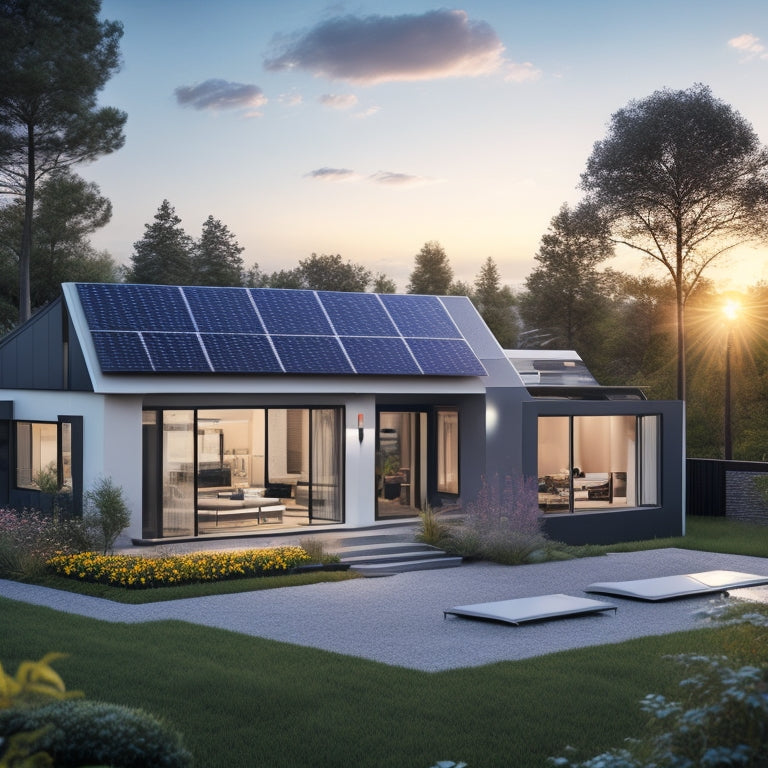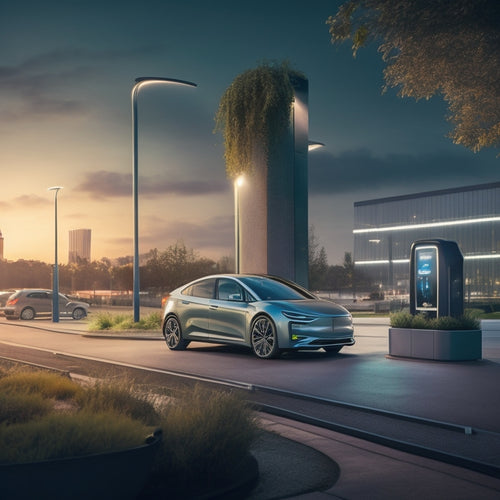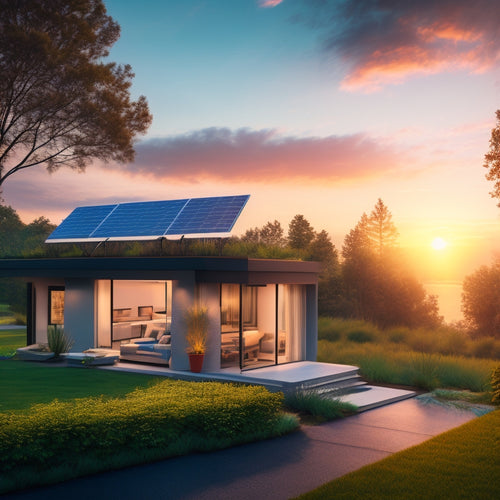
Why Home Energy Storage Is a Game Changer
Share
By embracing home energy storage, you're opening up a future of energy independence, sustainability, and cost savings. By integrating renewable energy sources and advanced battery technology, you'll reduce your reliance on the grid, minimizing your carbon footprint and energy bills. With a reliable backup power supply, you'll guarantee continuous power for essential needs during outages. Additionally, you'll protect critical systems and appliances, and future-proof your energy needs. As you investigate the benefits of home energy storage, you'll uncover a world of innovative solutions and customized systems that can transform the way you think about energy consumption.
Key Takeaways
- Home energy storage systems promote energy independence, reducing reliance on the grid and fostering sustainability through renewable energy integration.
- Reliable backup power supply during grid failures ensures continuous power for essential needs, enhancing energy resilience and community pride.
- Optimizing energy usage and reducing peak demand costs through home energy storage leads to significant savings on energy bills and a lower carbon footprint.
- Advanced battery technology and smart energy management systems enable efficient excess energy storage, maximizing storage capacity and reducing costs.
- Investment in home energy storage supports the transition to renewable energy sources, future-proofing energy needs and providing a valuable investment for homeowners.
Energy Independence at Last
You've long desired the freedom to generate and store your own energy, unshackling yourself from the grid's unpredictability.
Renewable integration enables you to utilize solar or wind power, feeding excess energy into your home energy storage system. This stored energy can then be used to power your home during periods of low renewable output or grid outages.
Effective grid interaction is vital, as it allows your system to seamlessly switch between grid power and stored energy. By optimizing this interaction, you can minimize reliance on the grid and maximize your energy independence.
To guarantee a reliable and efficient power source, it's important to perform a detailed load calculation and conduct an energy audit to assess energy consumption patterns and identify inefficiencies.
With home energy storage, you're no longer at the mercy of the grid's fluctuations, enjoying a newfound sense of control and autonomy.
Reliable Backup Power Supply
What happens when the grid fails, and you're left in the dark? With a home energy storage system, you don't have to worry.
This alternative energy solution provides a reliable backup power supply, ensuring your lights stay on and your appliances keep running. Advanced battery technology, combined with smart power management, seamlessly switches to stored energy when the grid connection is lost.
This energy automation enables your home to function independently, even during extended outages. By integrating renewable sources, such as solar or wind power, with a sturdy storage capacity, you can enjoy energy resilience and peace of mind.
With smart systems controlling your home's energy, you'll have a reliable backup power supply that's always ready when you need it.
Reducing Your Carbon Footprint
Regularly, homeowners seeking to reduce their environmental impact turn to home energy storage systems as a vital solution.
By integrating these systems with eco-friendly technologies like solar panels, you can markedly decrease your reliance on the grid and lower your carbon footprint. Home energy storage enables you to store excess energy generated during the day for use during periods of low sunlight or at night, reducing your consumption of non-renewable energy sources.
In addition, embracing energy independence and autonomy Energy Independence through solar power systems can encourage sustainability and community pride.
This approach to sustainable living not only benefits the environment but also contributes to a cleaner, healthier planet for future generations.
Lowering Your Energy Bills
By installing a home energy storage system, you can greatly lower your energy bills by reducing peak demand and optimizing energy usage.
This is achieved by storing excess energy generated by your solar panels or wind turbines during off-peak hours and using it to power your home during peak hours when energy rates are higher.
With advanced technology like real-time monitoring, you can track your energy usage and optimize it for maximum savings.
Additionally, systems like Tesla Powerwall and SimpliPhi Power offer modular designs that allow for customized energy storage, further reducing your energy expenditure.
Reducing Peak Demand
Your energy usage patterns have a significant impact on your energy bills, and one effective way to lower them is by reducing peak demand. By implementing peak shaving strategies, you can decrease your energy consumption during periods of high demand, which typically occur during hot summer afternoons or cold winter mornings.
This approach not only benefits your wallet but also contributes to grid stability. By leveraging demand response programs, you can participate in energy arbitrage, taking advantage of time-of-use pricing to store excess energy generated by renewable sources during off-peak hours.
Proper battery sizing and load shifting techniques can help you optimize your energy storage system. Additionally, utility incentives and community storage initiatives can provide additional financial benefits, making home energy storage a sound investment.
Optimizing Energy Usage
Energy usage optimization is a complex approach that involves fine-tuning your home's energy consumption patterns to minimize energy waste and reduce your energy bills.
By leveraging smart home integration and advanced energy management systems, you can gain significant savings on your energy costs.
To optimize your energy usage, consider the following strategies:
-
Time-of-use pricing: Shift non-essential energy consumption to off-peak hours when rates are lower.
-
Load management: Identify and prioritize energy-intensive appliances to optimize their operation.
-
Energy monitoring: Track your energy usage in real-time to identify areas for improvement.
Protecting Your Home Appliances
You're about to uncover how home energy storage can protect your appliances in ways that matter most.
During outages, you'll be able to power through with critical systems like refrigeration and medical equipment up and running.
With appliance priority control, you'll have the flexibility to allocate energy where it's needed most, ensuring your most essential appliances remain operational.
Power Through Outages
During extended power outages, critical home appliances like refrigerators and medical equipment can be compromised, leading to food spoilage, health risks, and financial losses.
You can avoid these issues by investing in home energy storage, which enables you to power through outages. This technology allows you to store excess energy generated by your solar panels or grid during the day for use when the grid is down.
Here are three benefits of home energy storage for outage preparedness and emergency response:
-
Uninterrupted power supply: Your appliances and devices will continue to function, ensuring your comfort and safety during an outage.
-
Reduced food waste: Your refrigerator and freezer will stay running, keeping your food from spoiling.
-
Enhanced emergency response: You'll have a reliable source of power for medical equipment, communication devices, and other critical systems.
Safeguarding Critical Systems
By safeguarding critical systems, your home appliances remain operational even when the grid fails, providing a sense of comfort and normalcy amidst the chaos of an outage. This is especially important for systems like refrigeration, which require continuous operation to maintain food safety. With home energy storage, you can guarantee system reliability and energy resilience, even during extended power outages.
| System | Consequence of Failure | Impact on Daily Life |
|---|---|---|
| Refrigeration | Spoilage of perishable food | Inconvenience, financial loss |
| Lighting | Reduced safety, difficulty maneuvering | Discomfort, anxiety |
| Medical Equipment | Health risks, equipment damage | Critical health implications |
| Water Pump | Inaccessibility to clean water | Significant discomfort, health risks |
| HVAC | Uncomfortable temperatures, damage to electronics | Discomfort, potential equipment damage |
Appliance Priority Control
Safeguarding critical systems is only the first step in guaranteeing your home remains functional during an outage.
With appliance priority control, you can take smart energy management to the next level. This feature allows you to prioritize which appliances receive power from your energy storage system during an outage.
You can program your system to power essential appliances like:
- Refrigerators to keep your food from spoiling
- Medical equipment to guarantee continued health and safety
- Water pumps to maintain access to clean water
Future-Proofing Your Energy Needs
With the increasing unpredictability of grid electricity and rising concerns about climate change, it's essential to think ahead and future-proof your energy needs.
By investing in home energy storage, you're taking a significant step towards sustainable technology and energy diversification. This enables you to integrate renewable energy sources, like solar or wind power, and reduce your reliance on the grid.
Battery innovation has made it possible to store excess energy for later use, increasing grid resilience and providing financial incentives through demand response programs.
With home automation and energy management systems, you can optimize your energy usage and maximize your storage capacity.
Frequently Asked Questions
Can I Use Energy Storage Systems for My Business or Just Home?
You're wondering if energy storage systems are only for homes, but they're not; you can use them for your business too, offering business benefits like system scalability, energy independence, and cost efficiency that'll enhance your bottom line.
Are Home Energy Storage Systems Compatible With Existing Solar Panels?
You'll be relieved to know that most home energy storage systems are designed for seamless solar integration, alleviating compatibility concerns, and can be easily retrofitted to work with your existing solar panels, ensuring a harmonious and efficient energy supply.
How Long Does It Take to Install a Home Energy Storage System?
You'll be pleased to know that the installation timeline for a home energy storage system typically takes 1-3 days, depending on the complexity of the installation process, which involves evaluating your electrical panel and connecting the system to your existing solar setup.
Do Energy Storage Systems Require Regular Maintenance or Replacement?
You'll find that energy storage systems typically require minimal maintenance, with replacement needs arising only after a certain system longevity threshold, such as 10-15 years, depending on factors like usage and maintenance frequency.
Can I Monitor and Control My Energy Storage System Remotely?
You're in total control, literally! With state-of-the-art remote monitoring, you'll access real-time energy management data, tracking performance and optimizing energy flow from anywhere, anytime - it's like having your energy storage system at your fingertips!
Related Posts
-

Solid State Batteries in Electric Vehicles
Solid-state batteries revolutionize electric vehicles by offering a longer lifespan and higher energy density than tr...
-

The Future of Residential Energy Storage
The future of residential energy storage looks promising and cost-effective for you. With lithium-ion battery prices ...
-

Top Solar Powered Camping Fans for Camping Enthusiasts
If you're a camping enthusiast, a solar-powered fan can be a transformative element for your outdoor experience. Thes...


